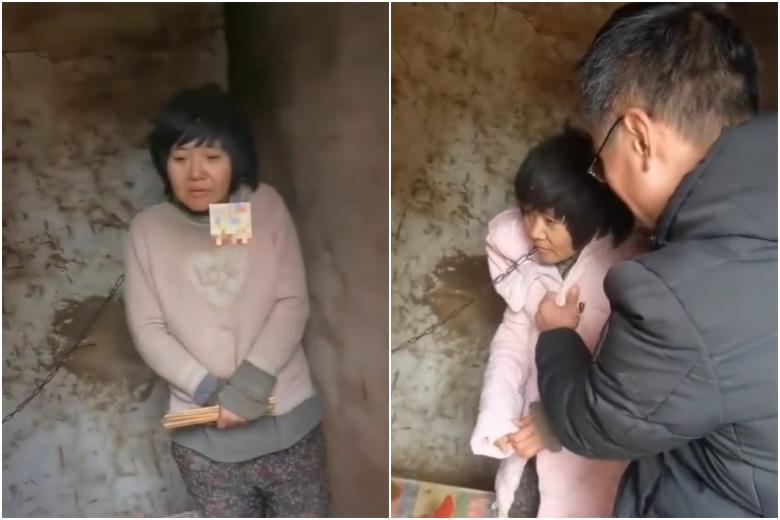China to tighten laws on trafficking of women, children
Sign up now: Get ST's newsletters delivered to your inbox

Images of a chained mother found to have been trafficked decades ago have pushed delegates to propose tougher penalties.
PHOTOS: SCREENGRAB FROM MANYA KOETSE/TWITTER
Follow topic:
BEIJING - Chinese Premier Li Keqiang on Friday (March 11) spoke out strongly against what he said were "serious violations of women's rights", after two cases of human trafficking and abuse triggered online outrage.
Saying he was "saddened and angry" over what happened, he vowed that the government will "resolutely pursue accountability" for trafficking crimes and severely punish perpetrators.
Others have also weighed in, including the country's top court and several lawmakers, making the protection of women's rights one of the hottest issues debated at this year's parliamentary sessions.
In late January, a video of a mentally ill woman chained in a dirty shack in Jiangsu province went viral.
Officials initially denied that the mother of eight was a trafficking victim.
Earlier this month, another video emerged of a farmer in Shaanxi province who forced a homeless woman into marriage and caged her.
Both videos went viral, sparking anger nationwide.
"Recently, serious violations of women's rights have occurred in some places. We are not only saddened by the victims, but also very angry about this," Mr Li said at his annual press conference at the end of the political meetings.
"Those who disregard the rights and interests of the masses must be resolutely held accountable, and those criminal acts of abducting and trafficking in women and children must be severely cracked down and punished severely."
Calling it a burden that the government must bear, he added that officials at all levels have to protect the rights of all.
The Supreme People's Court had said in its annual work report that it would impose the death penalty on human traffickers.
Since the two cases came to light, government departments have announced a series of moves and campaigns.
The Ministry of Public Security said last Tuesday that it was starting a year-long campaign targeting the trafficking of women and children, saying that it would mobilise "everything within its power" to tackle the issue. It would mainly focus on the homeless and mentally challenged.
Representatives to China's Parliament and its political advisory body have suggested ways to beef up the law.
Ms Jiang Shengnan, a representative to the National People's Congress (NPC), suggested that anyone involved in trafficking - be it coercing, abducting or detaining a victim - should be considered complicit in the process.
Under the Chinese law, anyone found guilty of buying a trafficked woman or child faces up to three years in jail. The term is less if the court finds that the buyer did not abuse or harm the victim.
In comparison, anyone found guilty of buying illegal plants or byproducts face up to seven years in jail, while those who trade in endangered animals face life imprisonment or death.
This is why the trafficking of women and children should be regarded as kidnapping, which comes with a minimum penalty of 10 years, said Ms Zhang Baoyan, an NPC representative who also heads a non-government organisation reuniting abducted children with their families.
"The longer the period of abduction, the greater the harm to a victim," she told the state-run People's Daily.
"We cannot be limited by statutory limits and not prosecute (historical crimes), allowing such traffickers to go scot free," she added.

